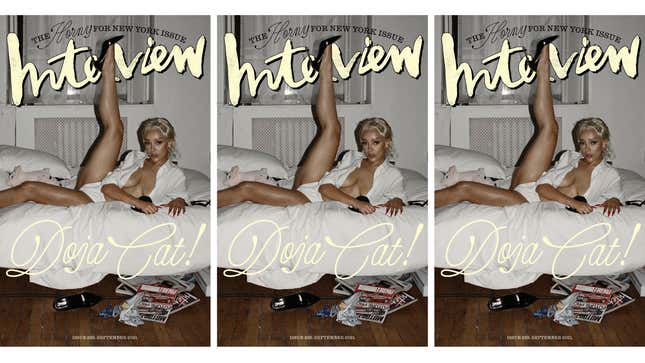
Nowadays, it seems anyone can go viral and become an overnight sensation, and with the rapid rise of social media, more and more people are putting their talents out there in a way we couldn’t have conceived of a decade or two years ago.
In the summer of 2018, Doja Cat’s voice became stuck in everyone’s heads. She dropped her track “Mooo!” on YouTube; an admittedly “goofy” single that rapidly spread across the internet—and she only rose from there.
Because she gained her momentum so quickly and almost exclusively on the internet, Doja Cat’s been through the wringer…and to be honest, she put herself through a lot of it. To date, her trajectory has included defending the racist allegations her song “Dindu Nuffin” garnered upon its release in 2020, videos circulating showing her allegedly stripping for white supremacists online—and participating in “racist incel” chatrooms. But her grind never stopped.
Legendary music icon and hip hop trailblazer, Missy Elliott spoke with Doja for Interview Magazine’s September cover issue, where the two talked about how there’s an industry standard that pushes artists to perform and produce for the consumer. Although of two very different generations of music, Elliott and Doja have a shared approach.
When talking about the execution of her first album, Elliott explains:
I didn’t listen to the radio. I didn’t watch videos. I didn’t do any of those things, and I didn’t realize how much that helped me at the time. But it helped, because me and [Timbaland], we didn’t mimic. So if we did something far-left, we weren’t afraid, because we didn’t know what was hot anyway. But now, when I got my phone and I’m seeing things, I can think of something really far-left and then I’ll be like, ‘They’re going to think I’m crazy. Let me reel it back.’
Doja agreed, saying Planet Her, her most recent album, was “going to sound way weirder, but [she] took some stuff out.” The weirdness and left-of-center-ness that Doja and Elliott have in common is a main draw to their fans.
That said, Doja’s work doesn’t come without doubts about her music, and she reflects on areas where she feels she could be better—both in execution and content.
“When it comes to rap I could be better. I think everybody feels that way with their own art, in all kinds of ways…I can be funny and charming, and I can do little punchlines here and there, but I need to talk about my life more, and about what’s going on,” she explains. There is a lot of pressure on artists to put all of themselves into every track.
Elliott agreed, sharing that around her fourth album, she “started talking about what [she] went through in [her] childhood,” and later adding: “People don’t realize that artists are sensitive or that they have feelings. When I was coming up we didn’t have social media, so we could turn off the artistry when we finished our interviews and went home.”
Soon, Doja may be coming into our homes; it was recently announced she would be performing at the VMAs on September 12. However, she’s since been promoted from performer to host according to a press release provided to The Root. On top of that, the former upstart is up for five awards, including Video of the Year and Artist of the Year.
Doja Cat and Missy Elliott’s full conversation for Interview Magazine’s September cover story is now available.

